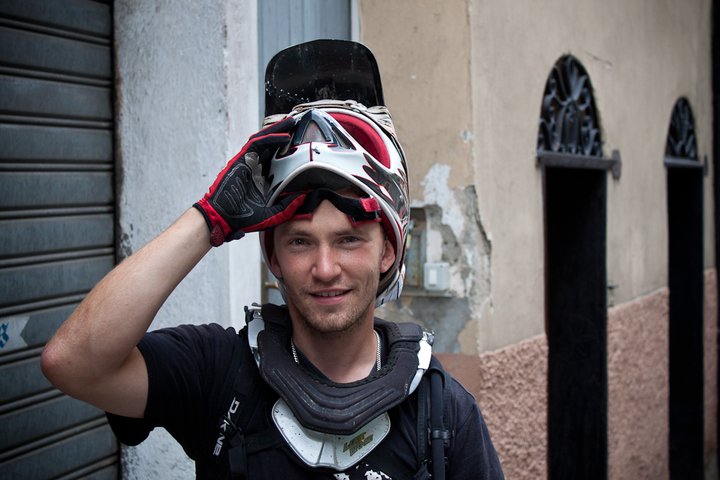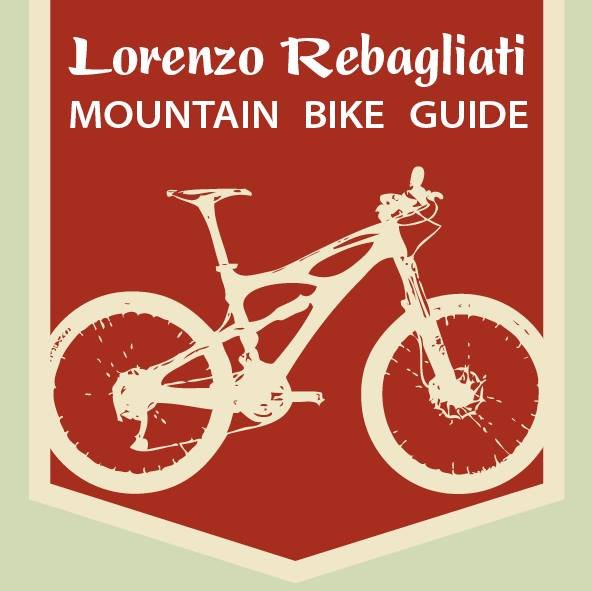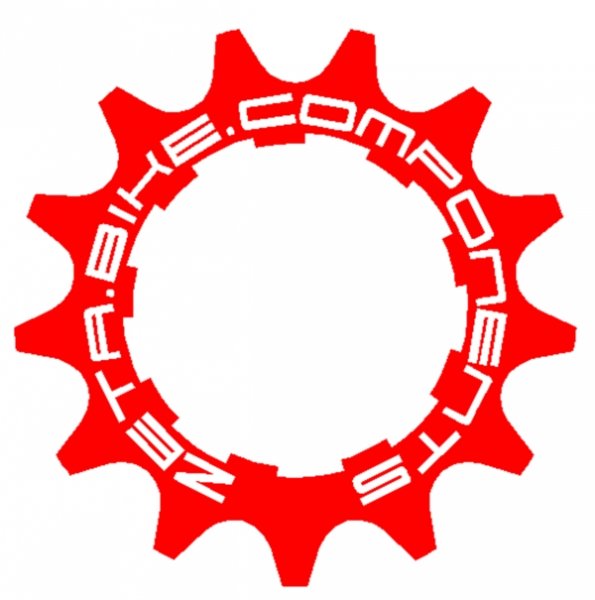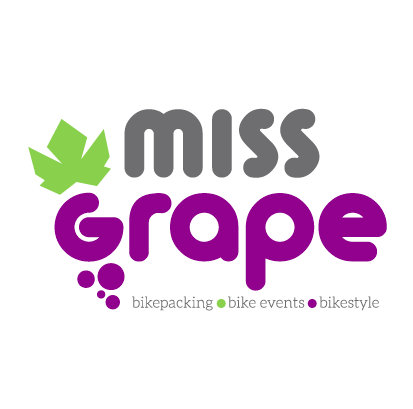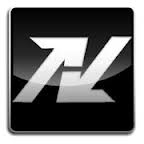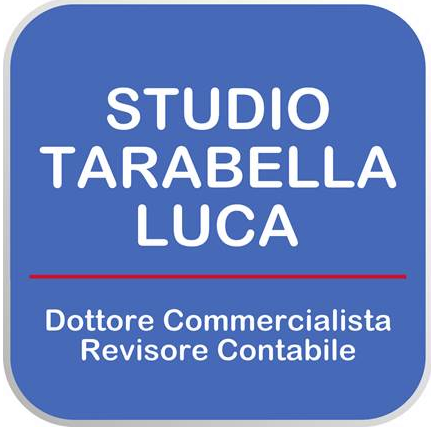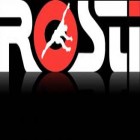Surreal afternoon, just done an interview for @wildpigsit, still don't know why anyone would want to interview me…
— Matt Wragg (@matt_wragg) September 19, 2012
Oggi amici cinghiali pubblico un’intervista doppia: in inglese e italiano… Leggete, cinghiali, leggete… Non rimarrete a bocca asciutta!
Mountain bike can be anything and nothing if you don’t know what you’re talking about . It’s not so easy to explain what does it mean and either is not so easy reveal the amazing part.
You can buy a magazine, go to check out some bikes in a shop and admire them but that’s just the beginning.
The rest? Buy one and push down on you pedal; That’s the way you will find it out. This is the truth but we wanna bring you in a place before.
A secret place that only a good eye can spot the effort, the technical skill and the nature of single instant. A place called photography. A place that can tell a story more than a thousand words. But when photography joins writing there’s no much left to say. Just let’s feed the eyes.
So here we are with Matt Wragg, a biker, a photographer, a writer.
La mountainbike può esser qualsiasi cosa oppure niente se non sai di cosa si sta parlando. Non è facile spiegarne il significato e neppure facile rivelare la parte sorprendente.
Puoi comprare una rivista, andare in negozio a guardarle e ammirarle dal vivo ma quello è solamente l’inizio.
Il resto? Comprane una e spingi sui pedali; Quello è il modo in cui lo scoprirari. Questa è la verità ma prima, noi, vogliamo portarvi in un posto.
Un posto segreto dove solo un buon occhio capace può individuare lo sforzo, le difficoltà tecniche e la natura intera, concentrata in un singolo istante. Un posto chiamato fotografia. Un posto che può raccontare una storia più di mille parole.. Ma quando la fotografia incontra la scrittura non c’è più nulla da dire. Saziamo gli occhi.
Eccoci qui con Matt Wragg, un biker, un fotografo, uno scrittore.
Q: Hi Matt and thanks a lot for this interview. So, what can you tell about you?
There’s not much to say – I still can’t work out why you’d want to interview me!
Q: Ciao Matt e grazie per aver accettato l’intervista. Che ci puoi dire di te?
Non c’è molto da dire. Non riesco ancora ad elaborare perché vogliate intervistarmi.
Q: First of all,are you a writer, a photographer or a biker ?
Rider. Always a rider first.
Q: Prima di tutto sei uno scrittore, un fotografo o un biker?
Un biker. Prima di tutto, sempre un biker.
Q: You are located in Liguria and spend most of your time moving around for Pinkbike. When did you start?
Errr… I started writing for Pinkbike last year, but it only became serious this year.
Q: Abiti in Liguria e trascorri molto tempo muovendoti in giro per Pinkbike. Quando hai iniziato?
Err… Ho iniziato a scrivere per Pinkbike lo scorso anno ma è diventato un impegno veramente serio quest’anno.
Q: Do you remember the first time bike-ride? I mean the one you felt ‘love’.
I can’t remember a time when bikes weren’t a part of my life, well maybe not for a couple of years at university, but yeah… so there wasn’t that one moment, it just what me and my friends all did when we were growing up and it has stayed with me. These days I need bikes to stay sane, they are the time when I go out without the internet, with money, a watch, anything… it’s time out from the world, life and work. I think being able to switch off for an hour or two is really important for managing your sanity.
Q: Ricordi la prima volta in bici? Intendo la prima in cui ti sei innamorato.
Non riesco a ricordare un momento in cui le biciclette non fossero nella mia vita, forse per un paio d’anni durante l’università, ma si… non c’è altro che quel periodo, è quello che facevamo io e i miei amici quando crescevamo ed è rimasta con me. Ora ho bisogno della bici per rimanere sano, sono il momento in cui esco senza internet, qualche spicciolo, un orologio, niente… E’ il momento senza tempo fuori dal mondo, vita e lavoro.
Credo che essere in grado di spegnere tutto per un’ora o due sia veramente importante per gestire la tua sanità mentale.
Q: And when and where the passion for photography entered your life and joined the bike-world ?
In 2009-2010, I spent the winter in New Zealand and played with friends cameras a few times, none of us really knew what we were doing, so we just pushed buttons trying to take photos of each other. When I got back and was earning money I bought myself a camera, but never really used it that much. I took some photos on holiday and then when I moved to Molini I started taking some photos for a blog on Pinkbike. From that I tried taking photos at a few races that year (2011), but didn’t really think anything of it. Then around Christmas last year I spent a month with one of my friends in New Zealand and spent some time working with a local photographer there, I learned a lot from the two of them. Coming back at the start of this year I started taking a few more photos and it kind of just went from there, it got a lot more serious very quickly…
Q: Quando e dove la passione per la fotografia è entrata nella tua vita e si è mescolata al mondo della biciclette?
Nel 2009-2010 ho passato l’inverno in Nuova Zelanda e ho ‘giocato’ qualche volta con la macchina fotografica e alcuni amici; nessuno di noi sapeva bene cosa stavamo facendo, così si premevano i bottoni a caso cercando di farci le foto gli uni agli altri. Quando sono rientrato e ho guadagnato un pò di soldi mi sono comprato una macchina fotografica ma non l’ho usata molto. Qualche foto in vacanza e quando mi sono trasferito a Molini ho iniziato a fare fotografie per Pinkbike. Da quel momento ho provato a fare foto in alcune gare (2011) ma non presagivo nulla a riguardo. Poi, nel periodo di Natale dell’anno scorso, ho trascorso un mese in Nuova Zelanda con un mio amico e passato molto tempo con un fotografo locale. Ho imparato moltissimo da entrambi. Rientrato nei primi dell’anno ho iniziato a fare ulteriori foto e penso sia allora che sia partito tutto, diventando veramente serio molto velocemente…
Q: When you are out for a photo-session how do you plan and spot the best places to capture the best light, terrain and action?
Plan? Ha! I don’t get many chances to really plan anything, even getting the chance to go and shoot with the good light at sunrise or sunset are rare. Most of the time I’ll end up going to a trail and making it up as I go along. With some of the races I try and get to the tracks the day before to find some spots and have a few ideas for the next day, but it depends how much time I have.
Q: Quando sei fuori per una sessione fotografica come pianifichi e identifichi i posti migliori per catturare la miglio luce, il suolo e l’azione?
Pianificare? Ah! Non ho molte opportunità per pianificare un bel niente, sono rare pure le possibilità di andare a scattare con buona luce all’alba o al tramonto. La maggior parte delle volte finisco per andare sul sentiero e piazzarmi li dato che ci vado da solo. In alcune gare ho anche provato i tracciati il giorni prima per scovare i posti e alcune idee per il giorno dopo. Dipende tutto da quanto tempo ho.

Q: I guess you always keep your eyes open as a photographer, always ready to look the detail that a non addicted guy will not observe, don’t you? What do your friends say? ‘hey, drop off your reflex for a while’ or something like that?
What’s a reflex? I think everyone sees the world differently, so you just go and look for something you like, something that appeals to you. Ian Hylands published a really good guide to basic composition on Pinkbike a couple of years ago, which is really helpful when you’re starting to think about how to put a photo together.
Q: Suppongo che tu tenga sempre un occhio da fotografo, sempre pronto a guardare dettagli che i non addetti non vedono, sbgalio? Cosa dicono i tuoi amici? ‘Hey, metti giù la reflex per un pò’ o qualcosa di simile?
Cos’è una reflex? Penso che ognuno veda il mondo in modo differente, così vai e guardi quello che ti piace, qualcosa che ti prenda. Ian Hylands ha pubblicato su Pinkbike un guida veramente buona sulle basi della composizione, è veramente d’aiuto se stai iniziando a fare fotografia.

Q: Is there a particular event your remind with pleasure? I mean, something funny or precious in your photographer carreer ?
I’m not sure you can call a few short months a career! I guess it was seeing my first photo in print, it was in the UK’s Dirt magazine. I love working with Pinkbike and online generally, but there is something truly special about seeing one of your photos properly printed in a good magazine. There’s something permanent, it’s hard to explain. I think it’s also a good sign that you’re doing things right, when you are just starting it’s hard to know where you are with your photos. A lot of the time you’ll have friends telling you something is good, which makes them good friends, but if you want to get better brutal, honest feedback is more useful. That makes it hard to get an unbiased opinion on how good your work is, but with the editor of a magazine if it’s shit, they’ll tell you it’s shit. I’ve had whole sets rejected and it sucks at the time, but hopefully you can go to them and ask why they weren’t right so you can learn for next time.
Q: C’è un evento particolare che ricordi con piacere? Intendo, c’è qualcosa di divertente o prezioso nella tua carriera da fotografo?
Non sono sicuro che si possa chiamare carriera qualche mese di scatti. Credo di poter dire sia l’aver visto la mia prima foto su una stampa per il regno unito, per Dirt Magazine. Mi piace lavorare online per Pinkbike, ma c’è qualcosa di veramente speciale vedere una propria foto stampata su una buona rivista. C’è qualcosa di permanente, difficile spiegarvi. Penso che sia un buon segno che tutto stia andando per il verso giusto perchè, quando inizi, è difficile capire quanto siano buoni gli scatti. Moltissime volte hai amici che ti dicono quanto sono belli, questo li rende dei buoni amici ma, se vuoi migliorare veramente, i giudizi onesti sono essenziali. Questo rende difficile avere giudizi imparziali sul tuo lavoro, ma con un editore, se è spazzatura (merda), ti diranno che è spazzatura. Ho avuto interi set respinti e scoccia alle volte, ma onestamente hai l’opportunità di chiedere perché non andavano bene e imparare per la prossima volta.
Q: And what about while biking ?
There are too many! A few weeks ago I was heading back to my house after a few bad weeks and I realised I was passing a friend’s house. I gave him a call and we arranged to meet for a coffee. He saw my bike in the car and said let’s go riding instead… We took these sketchy little cable cars up to a 1,000m above the valley floor and he took me down the most incredible, steep and technical singletrack you can imagine. After this bad weeks it was the best feeling in the world having the fresh loam spray against my legs as we pinned it down through the pines.
Q: E che ci dici del ‘mentre vai in bici’ ?
Ce ne sono troppi! Qualche settimana fa stavo tornando a casa dopo alcune ‘brutte’ settimane e ho realizzato di star passando vicino alla casa di un mio amico. Così gli ho dato un colpo di telefono e ci siamo accordati per un caffè. Quando ha visto la mia bici in auto e ha detto “Andiamo a pedalare”. Abbiamo preso una piccola funivia fino a quota 1000m, dominando così la valle. Mi ha condotto giù con il più incredibile, ripido e tecnico singletrack si possa immaginare. Dopo queste brutte settimane era la miglior senzazione del mondo: il fresco terriccio sparato contro le mie gambe mentre si puntavamo in discesa tra i pini.
Q: And again what about writing ? As we said before you write on Pinkbike and others magazines, it’s a complementary part or core stuff?
Writing was what I always wanted to do, it was what I planned on doing for Pinkbike, but I guess life had other plans. I still do some bigger pieces, but it’s hard to do the kind of writing I love when you are traveling as much as I do. To do it well you need to really shut yourself off from the world for a few days, which is a luxury I don’t have. I’ve got a few things I’m working on, but we’ll see. It’s also very hard to make a living just as a writer, there just isn’t that much work like that out there in mountain biking.
Q: E ancora, quando scrivi? Come abbiamo detto prima scrivi su Pinkbike e altre riviste, è una cosa complementare o essenziale?
Scrivere è sempre stato quello che avrei voluto fare, è quello che ho pianificato di fare per Pinkbike, ma la vita suppongo avesse altri piani. Faccio ancora alcuni grossi pezzi ma è difficile trovare quel tipo di scrittura che mi piace quando devi viaggiare come faccio io. Per farlo bene devi poterti staccare dal mondo per alcuni giorno ed è un lusso che non ho. Ci sono un paio di cose su cui sto lavorando ma vedremo. E’ anche molto difficile sopravvivere come scrittore, non c’è così tanto per la sola scrittura nel mondo della mountain bike.
Q: Do you read about the shooting location (history and other couriosity) before start writing the report?
I try to, I love stories. I think as a writer, photographer, journalist, human being, whatever you want to call it, I should be telling stories. They are one of the foundations of humanity and I worry sometimes they are getting lost these days, that people would rather watch a cat run into a window on YouTube rather than take in a story.
Q: Leggi qualcosa riguardo il posto dove andare a scattare (storia o altre curiosità) prima di iniziare a scrivere il tuo pezzo?
Ci provo, mi piacciono le storie. Penso, come scrittore, fotografo, giornalista, essere umano, qualsiasi altro modo tu mi voglia chiamare, io debba raccontare storie.
Sono uno dei fondamenti dell’umanità e a volte mi preoccupo perché si stia perdendo tutto questo, le persone preferiscono guardare un gatto in un video di Youtube piuttosto che riportato in una storia.
Q: How do you feel when you see your articles published and read from thousands ar more readers?
You just kind of come to accept it. Although I still think it’s very cool when I find out people have been reading my work in a place like Iran. I was asking a couple of guys over there about going over, but I check the travel advice for Iran and apparently they have a habit of imprisoning western journalists at the moment, so that idea died quickly.
Q: Come ti senti quando vedi i tuoi articoli pubblicati e lette da migliaia di lettori?
Finisci per accettarlo, sebbene io pensi sia molto fico trovare persone che hanno letto il mio lavoro in posti come ad esempio l’Iran. Ho chiesto ad un paio di tizi di quelle parti dato che ero intenzionato a farci una capatina ma ho controllato i consigli per viaggiare in Iran e apparentemente, hanno l’abitutine di imprigionare i giornalisti occidentali, così ho cambiato idea velocemente.
Q: Which is the best shooting location you have been? And the riding location?
For shooting? Probably Madesimo – the high valley above the town was so stunning. I just stopped by the lake for… I don’t know how long, and just sat there, stunned by how beautiful it was, thinking I could happily die in this place.
Q: Quale è il miglio luogo per scattare foto in cui tu sia stato? e per pedalare?
Per scattare? Probabilmente Madesimo, l’alta valle sopra la città è stupenda. Mi sono fermato al lago per … non so quanto a lungo, sedevo là, stupefatto da quanto fosse bella pensando che avrei potuto benissimo morire felicemente in posto così.

Q: Do you ever think ‘I need to ride this trail as soon as possibile’ during you photo sessions?
I try to ride everything I shoot! With Superenduro I go to the races a day or so early so I can ride everything before I start shooting. I think it’s important as if you’re going to write about a track, you should know what it feels like to ride it.
Q: Pensi mai ‘devo fare questo sentiero il prima possibile’ durante le tue sessioni fotografiche?
Provo a farmi tutto quello che fotografo! Con la Superenduro vado alle gare un giorno o che prima così potermi pedalare tutto il circuito prima di iniziare a fare foto. Penso che sia importante; se si deve scrivere del tracciato, si deve sapere che gusto ti dà pedalarlo.
Q: What kind of equipment do you carry around, I guess: a pc, your reflex, some lenses. What else?
Errr… Again, what’s a reflex? I carry 2 Canon 1D mkIIIs, a 70-200mm f/2.8 ISII, a 17-40mm f/4, 50mm F/1.8 and a 2x extender. I don’t uses flashes as like natural light. Always have something to play music too, I can’t function without music.
Q: Che tipo di attrezzatura porti con te, suppongo: un pc, la tua reflex, alcuni obiettivi. Che altro?
Err… ancora, che è una reflex? Porto 2 Canon 1D mkIIIs, un 70-200mm f/2.8 ISII, un 17-40mm f/4, 50mm F/1.8 e un 2x extender. Non uso flash, mi piace la luce naturale. Ho sempre qualcosa per ascoltare musica, senza non può funzionare.
Q: What do you do in your spare time? Do you ride? And if yes, is there your reflex in your backpack?
Spare time? What is that? Seriously, these days I rarely get to seen my own house… I love cooking when I have the time, reading, pottering around the house not doing very much. With the way my life is these days, spending a few days at my own home would be like a holiday for me. And yes, I ride too, I try and ride most days, even if it’s just a fast loop up from my house and back.
Q: Cosa fai nel tuo tempo libero? Vai in bici? Se si, c’è la tua reflex nello zaino?
Tempo libero? Cos’è? Seriamente, al momento raramente vedo casa mia… mi piace cucinare quando ho tempo, mi piace leggere, fare lavoretti per casa, non faccio molto altro. Per come è la mia vita di questi tempi trascorrere alcuni giorni a casa mia sarebbe per me come una vacanza. E si, vado anche in bici, ci provo tutti i giorni, fosse anche un veloce anello da casa e ritorno.
Q: Is there something you can tell to everyone who wants enter the sport photography?
Get as much advice as you can. I’ve been really lucky to have been able to get advice from some good photographers: Alex Boyce, Matteo Cappe, Ian Hylands, Stefan Haworth and my friend Luke Sergent who doesn’t realise how talented he is. That and take lots of photos – go to races or whatever where you can shoot all day as the more photos you take the more you can learn.
Q: C’è qualcosa che puoi dire a chiunque voglia avviarsi alla fotografia sportiva?
Prendete tutti i consigli possibili. Io sono stato veramente fortunato ad avere consigli da buoni fotografi: Alex Boyce, Matteo Cappe, Ian Hylands, Stefan Haworth e il mio amico Luke Sergen che non sa quando talendo abbia davvero. Ecco, quello e un sacco di foto. Andate alle gare o dove potete scattare per tutto il giorno; più foto scattate, più imparerete.
Q: As a writer, following a structure is essential, but that is not enough, am I right?
You just need a structure. It sounds simple to have a beginning, middle and an end, but so many people forget about it time and again. I guess it’s something that university drills into you – writing essays you need an intro, your main body and a conclusion. After that it’s all feel, there’s discipline in making sure you stay focused and don’t fill the lines with crap. A structure means you have a goal of what you want to do with the piece so you just need to ask yourself, “does this help me get to this goal?”
On talent…
I think it’s something that’s either there or not, and sitting here I can’t even tell you whether I can really write or not. On that level it’s not something you can learn and all the teaching in the world won’t change it. Sure, I feel like I can get things over clearly, but there’s something else, something more that some writers can do. If you read people like Hunter S. Thompson, Charles Bukowski or Raymond Carver, they can say very powerful things very simply, with everyday language. That’s talent. And these days most people don’t even give a fuck. Hunter S. Thompson’s most popular book is Fear and Loathing in Las Vegas, I wonder how many people who read that book realise it contains one of the best paragraphs in the English language and not just stories about taking ether? I’ve worked with enough people over the years who think they can write, because they think it’s just putting words down and they’ve got a copy of Word too. There’s a great quote by Bukowski about writing, he felt that not everybody was supposed to be a writer. Maybe the words would come for you one day, maybe they wouldn’t. The worst thing you could do was force it and you need to accept that it might never happen for you. But I guess this is getting away from mountain bike journalism and into something else…
Q: Come scrittore seguire una struttura è essenziale ma non basta, dico bene?
Hai solo bisogno di una struttura. Può sembrare banale avere un preambolo, uno svolgimento e una chiusura ma molte persone a volte se ne dimenticano. Suppongo che sia una delle cose che ti inculcano in testa all’università – per scrivere le tesi d’esame hai bisogno di un inizio, un corpo centrale e una conclusione. Dopo questo è puramente una questione di gusto, ci sono discipline che ti permettono di rimanere concentrato e non riempire le ‘linee’ con della merda. Una struttura significa avere uno scopo per il pezzo che stai scrivendo così ti devi chiedere ‘questo mi aiuta a raggiungerlo?’
Sul talento…
Credo che sia una cosa che c’è o che non c’è e stando seduto qui non posso neanche dire di saper scrive o no. A certi livelli non è qualcosa che si può imparare e neppure tutti gli insegnamenti di questo mondo possono cambiarlo. Certo, penso di poter concludere i miei pezzi in maniera pulita e chiara, ma c’è altro, qualcosa che altri scrittori possono fare. Se leggete scrittori come Hunter S. Thompson, Charles Bukowski o Raymond Carver, sanno essere molto ‘potenti’ e in maniera molto chiara e semplice con un linguaggio di tutti i giorni. Questo è talento. Di questi tempi alla maggior parte delle persone non frega un cazzo. Il libro più popolare di Hunter S. Thompson è ‘Fear and Loathing in Las Vegas’, mi chiedo quante persone che abbiano letto quel libro si siano rese conto che contiene uno dei migliori paragrafi della lingua inglese e non solo storie sull’etere. Ho lavorato con abbastanza persone in questi anni che pensavano di poter scrivere perché credono basti buttar giù qualche parola nella loro copia di Word. C’è una bella citazione di Bukowski sulla scrittura, sentiva che non tutti sono supposti scrittori. Forse le parole arriveranno un giorno, magari mai. La cosa peggiore che si possa fare è forzare la mano e accettare che magari non ci sarà mai un tuo momento. Ma suppongo che questo stia andando oltre il giornalismo sulla mountain bike e verso qualcosa d’altro…
Q: What’s your next big deal event?
Big deal event? Probably the Supermountain race at Scopello in a couple of days.
Q: Quale è il tuo prossimo ‘grande’ evento?
Il prossimo grande evento? Probabilmente la gara di Supermountain tra qualche giorno.
Concludo qui questa intervista avendo toccato due mondi diversi: la fotografia e la scrittura. Entrambi racchiusi in un solo elemento sensoriale: la vista.
Grazie ancora a Matt Wragg per avercelo concesso e chiedo perdono per la traduzione personale 🙂 Spero di non aver storpiato troppo.

